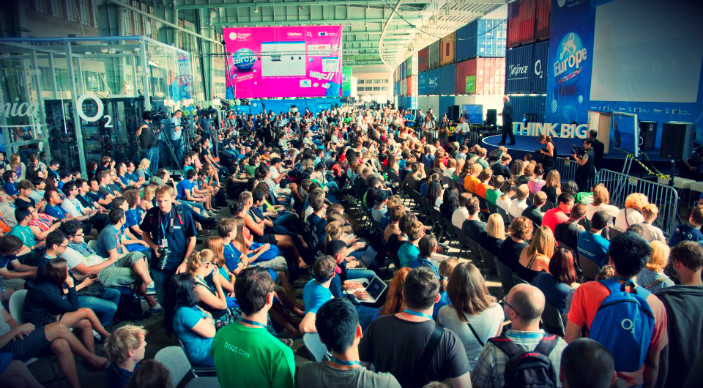By Maximiliano Firtman (@firt | Firt.mobi). Max is an industry-leading, Buenos Aires based mobile and web developer with nearly two decades of experience. He has authored numerous books on programming, travels the world speaking at conferences and has founded several companies.
Confession time: I am a developer and I love the open Web. I love it for different reasons.
 I’ve been creating apps and websites for more than 18 years in an almost infinite variety of native platforms and languages.
I’ve been creating apps and websites for more than 18 years in an almost infinite variety of native platforms and languages.
Despite the gigantic leaps that have been made by the technology industry in recent years, consumer expectations are evolving and they expect more and more from technology. This in turn is pushing companies and developers to adopt a frantic rate of innovation to simply keep up; otherwise hardware, platforms and services become stale in the consumer’s eyes. This trend is particularly rampant in mobile technology, particularly smartphones.
Speed of mobile change unmanageable
The rate of change in mobile devices today is astonishing. The leading device changes every couple of months, often more frequently. For developers trying to create apps and websites, this kind of accelerating, frantic pace of change makes creating robust products with any kind of longevity almost impossible.
Then there is the sheer number of platforms. The mobile ecosystem has grown to an unmanageable level today: from Apple’s iOS and the variety of Android-flavoured devices from dozens of manufactures using the Google-sponsored operating system, to Microsoft’s Windows Phone and emerging platforms like Firefox OS, BlackBerry 10, Sailfish and a host of other smaller players. Each platform has its own rules, standards, language, quirks and nuances. Developing products for one is rarely as simple as developing for another. It is similar to a company trying to do business in different markets around the world; ostensibly the process is the same but every market has its own laws, rules and nuances, making it a difficult (and expensive) process to be a truly global player.
Underlying all of this is the inherent US-bias currently shaping the global technology market, driven by companies like Facebook, Apple and Google. However, while these dominate the market in the US and Europe, visit other key markets in Latin America, Africa and Asia and you’ll find consumers using a variety of other platforms alongside the key players.
Focusing on just two platforms is both short-sighted and dangerous. The mobile is such an important platform. We are in the post-PC world where mobiles now dominate web and internet access and they will connect the next two billion internet users. Assigning such responsibility and power to just two providers not only limits consumer choice, but also restricts developer creativity. The constraints imposed by the business models and internal standards benefit the ecosystem owner, not the consumer.
The open web is the only solution
The open web – which encompasses web technology, open standards, transparency and decentralisation – is the only answer. The open web will reduce the usage of closed ecosystems becoming so prevalent and open the web to everyone on a global basis. An open set of standards makes knowledge from around the world available to a global audience, independent of nation, manufacturer or ecosystem.
As other contributors to #TheOpenAgenda point out, the big question we now need to resolve is the actual difference between an app and a website. To ask what the actual need is met through developing an app? Whether we should be creating both an app and a website? These are critical questions for developers and brands.
The current situation finds developers creating an app for a single platform, only for the code to become partially obsolete within a year as the platform evolves. Apps have to be continually updated as the platforms evolve. But web apps, built to open standards, can change this blurring the lines between website and native app, bringing many of the benefits of the web, while also offering the benefits of native apps, such as offline execution.
The backdrop to all this is a question of power. When the web was born, the users held the power. Gradually the developers gained the power as they learnt to evolve and grow the technological building blocks of the internet. Today the power has passed to the few technology companies – particularly Apple and Google – and their proprietary mobile ecosystems.
Restricting services just to two platforms in this way is threatening the entire future of information and services as we know it.
Developers, however, have their own part to play in the transition to an open web. There are two main problems currently. First is a widespread misunderstanding about the platforms themselves. Consumers tend to just think about ‘websites ‘or ‘apps’, with little understanding of the different capabilities of different platforms. It is our responsibility to ensure that developers recognise the variety of platforms and ecosystems that now exist, and why an Open set of standards will act as a uniting force to bring them all together.
HTML5 is not a panacea
The second problem is a lack of specifications. HTML5 goes a long way in addressing this problem and is being hailed by many as the future of the internet. As devices evolve and become more powerful, developers want to do more with the features on offer. They are starting to use experimental code and to exploit APIs to get the most they can out of a platform. But it is currently very difficult to replicate success across platforms.
HTML5 addresses the cross-platform problem and it may currently be considered the base of the open web. But we are in danger of focusing too much on just one solution at the expense of the wider picture. Whether it is HTML5 or HTML6 or something else entirely, in a few years we could be pinning our hopes on something completely different.
The point is, while HTML5 goes a long way to introducing a shared set of standards to the web, it isn’t the be all and end all. We mustn’t doggedly pursue one magic bullet that will suddenly bring about an open internet. Instead we need to find some common ground to all use open web technology to provide content solutions and interactive applications for users around the world at anytime, anywhere.
The good news right now is that most platforms support HTML5 as it is the easiest way to port experiences across devices. Projects like Google Glass are genuinely exciting as they are starting to demonstrate how a truly open experience might work.
I’ve focused on developers as I do believe they are key in driving a more open, collaborative web. However, they cannot do it alone. Everyone from ecosystems to vendors to manufacturers to carriers needs to be fully behind a truly open environment. It bemuses me that companies which are so focused on attracting customers and on boosting their bottom line would still pursue a business model that penalises large swathes of users (and therefore potential customers) that don’t access one particular ecosystem.
Additionally, the distinction between desktop and mobile internet access is blurring more every day, and will disappear altogether in a couple of years. Rather than talk about mobile or PC access we’ll just talk about ‘devices’. In the next year these devices will be a mix of tablets, mobiles and desktop PCs. The release of connected watches, glasses and other wearable tech will follow shortly after. We’ll then be talking about just screens, input devices, and content. Mobile developers will simply become developers, mobile manufacturers simply device manufacturers. The whole ecosystem will simplify and, hopefully, so will the standards.
There isn’t a better time for the industry to agree and commit to an open future. We’ve come an enormously long way in an extremely short space of time, and we are hurtling towards a tipping point that could one day come to define the evolution of the web, the internet and our relationship with our devices.
If we can come together as developers, manufacturers and ecosystems now to agree a set of open standards and specifications, we open up the future for not only ourselves, but every consumer around the world.
Openness is worth fighting for so add your voice – “I support openness in digital, technology & innovation #TheOpenAgenda http://bit.ly/openagenda” Tweet this directly ![]()
![[Guest Post] An open philosophy can unify the fragmenting web – #TheOpenAgenda | Max Firtman](https://en.blogthinkbig.com/wp-content/uploads/sites/5/2013/03/open-web-html5.jpg?resize=610%2C225)

![[Guest Post] Coding and the open web – #TheOpenAgenda | Decoded’s Kathryn Parsons](https://en.blogthinkbig.com/wp-content/uploads/sites/5/2014/07/shutterstock_119236960-coding.jpg?resize=p%2Co)






